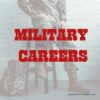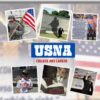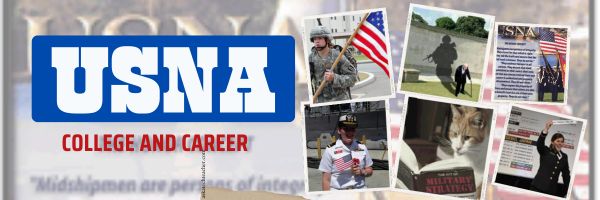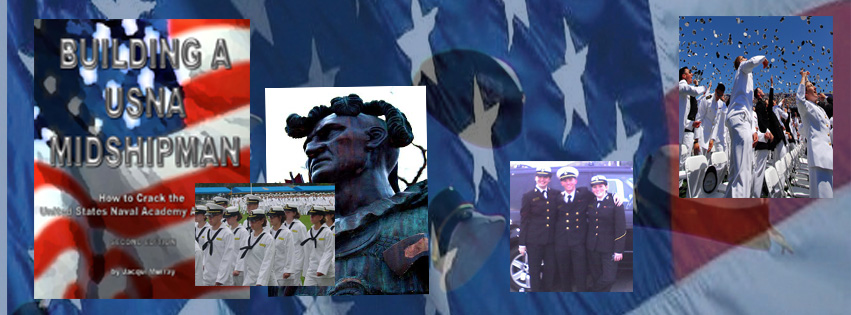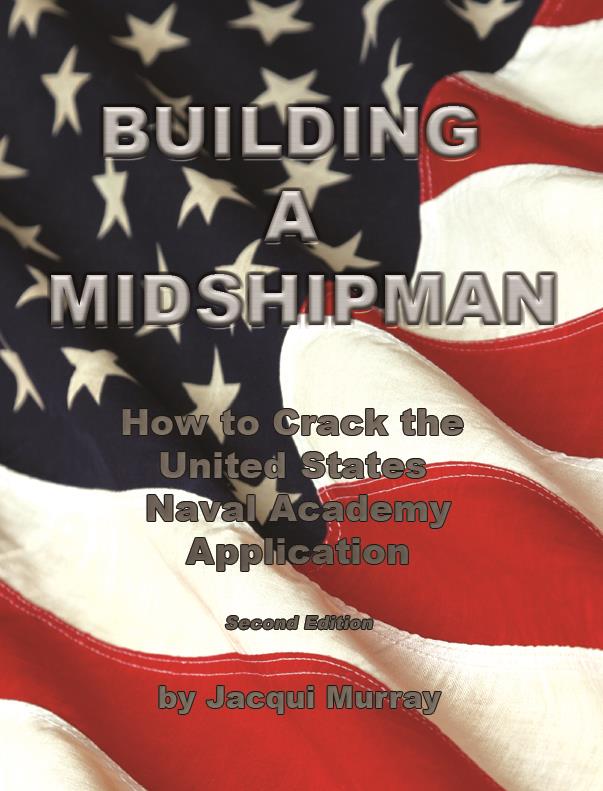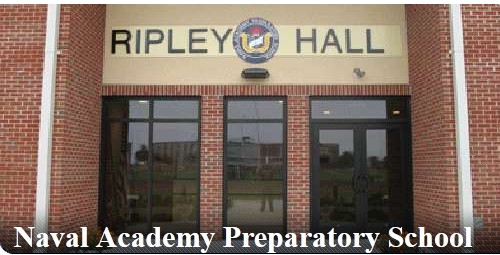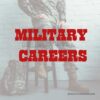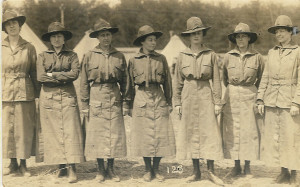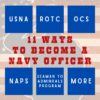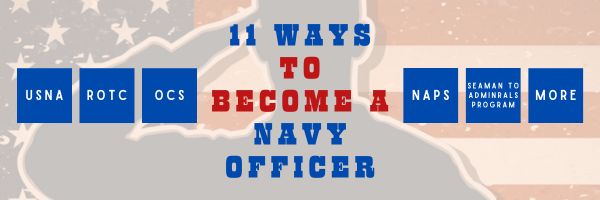Tag: military careers
Preparing for the College Interview
The College Interview is intimidating and usually only applies to the Ivy League schools. If you’re considering the US Naval Academy, it’s called a Blue and Gold Interview. They will put you through a rigorous test of thinking on your feet, fast, and without ‘umms’.
Here’s what you should know:
The B&G (Blue and Gold) Interview is one of several opportunities for the Naval Academy to insure they appoint candidates who will make it through the next nine years.
[caption id="attachment_2361" align="alignright" width="246"] Questions your B&G Officer may ask[/caption]
Questions your B&G Officer may ask[/caption]
Few colleges invest the time and money in a personal in-home interview. For the Naval Academy, it’s a mandatory step, and an important nod in the approval process. The BGO (Blue and Gold Officer) knows you better than any other person involved in the selection process. His/Her opinion of you will weigh heavily as they review your application. Make sure by the time of this interview, you have developed a good rapport with yours. You chatted with him/her at several Academy Nights, emailed him/her at critical junctures in the application process, and updated him/her on your progress.
Here’s how it went for my daughter:
He arranges a coffee meeting at a local restaurant. You decide to wear khaki pants and a collared shirt—conservative, respectful, but not a tie-and-jacket-pretentiousness. His questions remind you of those at the Congressional Interview—why do you want to attend the Naval Academy? What will you do if they don’t select you? Nothing tricky. By now, you’ve passed the Naval Academy’s physical test so he commends you on that. His lone suggestion reminds you to continue increasing your SAT scores, currently at 1350. He suggests a review course. Your time restraints make this difficult: Although it’s senior year, you have eight classes (including four APs). You’ve dropped the violin lessons, practice time reserved for Orchestra at school (where you are the Concertmaster) and the Youth Symphony Sunday sessions (where you are 1st violin). You know yourself. If you overload your schedule, you implode. You’ve learned this from Freshman Year experiences. You do commit to taking advantage of the free Princeton Review SAT course offered at school for IB (International Baccalaureate) applicants.
All in all, a stress-free interview. It ends with you returning home to study Calculus. You send a thank-you note to your BGO, and sign it “Go Navy Beat Army!” You start checking the CIS website to see when it shows up as completed. Not yet, but it’s only been six hours….
–Taken from Building a Midshipman
Share this:
- Click to share on Facebook (Opens in new window) Facebook
- Click to share on X (Opens in new window) X
- Click to share on LinkedIn (Opens in new window) LinkedIn
- Click to share on Pinterest (Opens in new window) Pinterest
- Click to share on Telegram (Opens in new window) Telegram
- Click to email a link to a friend (Opens in new window) Email
- More
Applying for a Military Academy
Military academies offer benefits most high school students and their parents don’t realize:
- the quality of education is comparable to an Ivy League
- they not only provide you with an education, but provide a job when you finish–no job hunting, no rejections,
- they pay you to go to school–that’s right, each of the four years, you are paid more to attend classes and complete the other activities required to graduate
- they are free–no charge for classes, books, room and board; they even pay for your summer school
But they are picky. Applying pits you against a huge pool of highly-qualified applicants. It’s not just about who has the best GPA and SAT scores. Admissions weighs:
- scholastics
- physical
- moral
- personal drive
To gain acceptance requires something different than the usual preparation. Here’s one book to prepare you:
Building a Midshipman
by Jacqui Murray
Available: Amazon
You don’t have to be a miracle-worker to the 10% of applicants accepted to a military academy, but you do need a plan. For the thousands of students who apply every year–and slog through the numbing concatenation of decisions preceding a nomination–there is no greater discouragement than the likely event that they will fail. This, though, is the Board’s peek into an applicant’s moral fiber and an important ingredient to the go/no go decision.
In the words of James Stockdale, USNA ’46 and Medal of Honor Winner: “The test of character is not ‘hanging in there’ when you expect a light at the end of the tunnel, but performance of duty and persistence of example when you know that no light is coming.”
This is the true story of Maggie Schmidt, an All-American kid who dreamt of attending the Naval Academy when her research into the typical Midshipman uncovered a profile alarmingly like herself. This book describes her background and academic interests, her focus, as well as her struggle to put together a winning admissions package. Along the way, you gain insight into the moral fiber that grounds everything she does and the decisions she must make that some consider impossible for an adolescent, but are achievable for thousands of like-minded teens. This workbook walks you through the long process, provides check lists of everything required, decision making matrices, goal-setting exercises to determine if USNA is a good fit for you, and a mix of motivation and academic advice to balance a decision that rightfully might be the biggest one most teens have ever made.
Share this:
- Click to share on Facebook (Opens in new window) Facebook
- Click to share on X (Opens in new window) X
- Click to share on LinkedIn (Opens in new window) LinkedIn
- Click to share on Pinterest (Opens in new window) Pinterest
- Click to share on Telegram (Opens in new window) Telegram
- Click to email a link to a friend (Opens in new window) Email
- More
Summer STEM at USNA
Summer STEM (Science, Technology, Engineering & Mathematics), is a week-long, overnight camp at USNA each year for students currently in the 7th-10th grades. Here’s information from the USNA website:
Engineering is all about creating, building, and making things better! So what does it take to be an engineer? If you like math and science, you are off to a great start. If you enjoy discovering new things, solving problems, and learning how things work – even better! Creativity, persistence, and the desire to make the world a better place are also important qualities. Becoming an engineer requires hard work and a good education. Our summer program will be a great start to your career in science and engineering.
The schedule:
Monday: Travel and Check-in
Tuesday: Air and Space Museum/DC Tour
Wednesday – Friday: Stem modules and presentations (Students will visit all science and technology majors at the US Naval Academy)
Saturday: Open House and Demonstrations—Share your new skills with your parents and friends. End the week by putting your projects on display.
Share this:
- Click to share on Facebook (Opens in new window) Facebook
- Click to share on X (Opens in new window) X
- Click to share on LinkedIn (Opens in new window) LinkedIn
- Click to share on Pinterest (Opens in new window) Pinterest
- Click to share on Telegram (Opens in new window) Telegram
- Click to email a link to a friend (Opens in new window) Email
- More
Didn’t Get in College? Interested in the Military? Try NAPS
The Naval Academy Preparatory School (NAPS) is located on Naval Station Newport in historic Newport, Rhode Island. The Naval Academy Preparatory School is the Navy’s fourth oldest school; only the Naval Academy, Naval War College, and Naval Post Graduate School are older.
The mission of the Naval Academy Preparatory School is to enhance midshipman candidates’ moral, mental, and physical foundations to prepare them for success at the U.S. Naval Academy. The ten-month course of instruction at NAPS, lasting from August through May, emphasizes preparation in English Composition, Mathematics, Chemistry, Physics, and Information Technology.
Demanding military, physical and character development programs complement the academic preparation to fully prepare students for the challenges of life at a service academy. As part of the physical development program, NAPS offers a varsity athletic program that competes against other preparatory schools, junior colleges and college junior varsity teams.
Curriculum
-
Academics: Core courses like mathematics (typically pre-calculus or calculus), English, chemistry, and physics. These mirror the foundational subjects at USNA, giving students a head start.
-
Physical Training: Intense physical conditioning to meet the fitness standards of the Naval Academy, including swimming, running, and strength exercises.
-
Military Training: Leadership development, naval customs, and discipline to instill the ethos of a future naval officer.
Admissions
Life at NAPS
Outcomes
Share this:
- Click to share on Facebook (Opens in new window) Facebook
- Click to share on X (Opens in new window) X
- Click to share on LinkedIn (Opens in new window) LinkedIn
- Click to share on Pinterest (Opens in new window) Pinterest
- Click to share on Telegram (Opens in new window) Telegram
- Click to email a link to a friend (Opens in new window) Email
- More
New Series on Military Careers for High School Students
This is a new Ask a Tech Teacher series on College and Career with a focus on military options.
High school students contemplating a military career should research extensively, speak with recruiters, and perhaps participate in preparatory or introductory military programs to make an informed decision. Each branch of the military has unique offerings, so aligning personal goals with the branch’s culture and opportunities is crucial. There are several pathways for post-HS: opportunities for personal development, education, and professional training. Here’s an overview:
- Join directly from High School:
-
Enlistment: Students can enlist in one of the six branches of the U.S. military: Army, Navy, Air Force, Marines, Coast Guard, and Space Force. This path typically requires passing the Armed Services Vocational Aptitude Battery (ASVAB) to determine suitability for specific roles. High school graduates can start as enlisted personnel, gaining hands-on experience in various military occupations.
-
Benefits: Enlisting offers benefits like tuition assistance, health care, housing, and retirement benefits. The military provides training in over 150 career fields, many of which only require a high school diploma or GED.
-
Programs for Experience: Programs like the Junior Reserve Officers’ Training Corps (JROTC) in high schools can provide students with early exposure to military life, teaching leadership, citizenship, and discipline.
-
- Attend college before entering the military:
-
Service Academies: High school students can apply to one of the U.S. military academies (e.g., West Point for Army, Naval Academy for Navy, etc.), which offer a combination of college education and military training. These are highly competitive and require congressional nomination. Graduates earn a commission as officers.
-
ROTC (Reserve Officers’ Training Corps): This program allows students to attend college and receive military training simultaneously. Upon graduation, ROTC participants commit to a period of service as an officer. The program offers scholarships that can cover tuition, fees, and other expenses.
-
This series will delve into making the military part of college-career choices. Here are some of the articles you’ll see with links to those already published:
- 5 Must-do Skills to Accomplish During High School
- 9 Secrets for Getting into a Service Academy
- 11 Ways to Become a Navy Officer and a Gentleman
- Apply for a Military Academy
- Average USNA Candidate
- ASVAB or a Service Academy? You Decide.
- College Bound: Take Inventory
- Didn’t get into a Military Academy? Try NAPS
- Goal Setting for a Fourteen-year-old
- OCS–an option
- STEM at USNA
- Successful USNA Graduates
- You’re a Sophomore and Interested in USNA
Here’s the sign-up link if the image above doesn’t work:
https://forms.aweber.com/form/07/1910174607.htm
“The content presented in this blog are the result of creative imagination and not intended for use, reproduction, or incorporation into any artificial intelligence training or machine learning systems without prior written consent from the author.”
Jacqui Murray has been teaching K-18 technology for 30 years. She is the editor/author of over a hundred tech ed resources including a K-12 technology curriculum, K-8 keyboard curriculum, K-8 Digital Citizenship curriculum. She is an adjunct professor in tech ed, Master Teacher, freelance journalist on tech ed topics, and author of the tech thrillers, To Hunt a Sub and Twenty-four Days. You can find her resources at Structured Learning.
Share this:
- Click to share on Facebook (Opens in new window) Facebook
- Click to share on X (Opens in new window) X
- Click to share on LinkedIn (Opens in new window) LinkedIn
- Click to share on Pinterest (Opens in new window) Pinterest
- Click to share on Telegram (Opens in new window) Telegram
- Click to email a link to a friend (Opens in new window) Email
- More
Five Must-Do Skills to Accomplish During High School
Lou Holtz, the University of Notre Dame’s erudite ex-coach, entrusted with turning UND football players into graduates, once exhorted, “How you respond to the challenge in the second half will determine what you become after the game, whether you are a winner or a loser.”High School is like the second half, and you’re about to find out if you’re a winner. At the starting line, all students are equal, crossing the freshman threshold with the same opportunities, and same possibilities for their future. The 4.0 student stands shoulder to shoulder with the star athlete, and the C student who aspires to nothing more than minimum wage work has an equal chance that inspiration will strike. Every one approaches the starting line, not knowing if the race will be won with brains, hard work, willpower, or intensity of desire.
But you’re different. You know what you want: USNA. There are five general skills you’ll have to learn over the next three years (if you don’t have them by the time applications go out, prior to senior year, it’ll be too late).
- How to solve problems
- How to manage your time
- How to prioritize
- How to get along with people
- How to think

Maybe you’re thinking, that’s easy. I do it every day. Or maybe you’re wondering: How do I make this happen? I can answer both: It’s not easy or everyone would do it. The only thing easy is the instructions for making it happen. (more…)
Share this:
- Click to share on Facebook (Opens in new window) Facebook
- Click to share on X (Opens in new window) X
- Click to share on LinkedIn (Opens in new window) LinkedIn
- Click to share on Pinterest (Opens in new window) Pinterest
- Click to share on Telegram (Opens in new window) Telegram
- Click to email a link to a friend (Opens in new window) Email
- More
Goal Setting for a Fourteen-year old
Can a high school freshman be goal-oriented? Should they—or is this too early? Though many deliberate, no one yet has invented a time machine to unring the proverbial bell. And high school requires the ringing of many academic, social and economic bells. Many future-shaping decisions become final based on these four years.
Zoe, like your sons and daughters, is thinking about which college she wants to attend. Some value just academics, and others academics and sports/fine arts/community service/a passionate involvement in something. Often contradictory, choices must be made early in the high school regarding ambitions, focus, and intents.
‘No goals’ means decisions are made for you. If you don’t commit yourself to “do” high school (work hard, take challenging classes, never never never give up even one extra-credit point on a test), then you have made a choice. It’s passive, but effective. Each time you make the decision to skip studying for one test, or make the decision to not put the extra time into one project, you shorten the height of your grasp on the future. Too many compromises, and goals become dreams for someone ‘luckier’ than you. (more…)
Share this:
- Click to share on Facebook (Opens in new window) Facebook
- Click to share on X (Opens in new window) X
- Click to share on LinkedIn (Opens in new window) LinkedIn
- Click to share on Pinterest (Opens in new window) Pinterest
- Click to share on Telegram (Opens in new window) Telegram
- Click to email a link to a friend (Opens in new window) Email
- More
ASVAB or a Service Academy? You Decide.
If you want to join the military, you can do that by attending a four-year Service Academy or by enlisting. I discussed 11 ways to become a Navy Officer in an earlier article (click for link). Here, I’ll focus on the academics required to be accepted as an enlisted soldier or sailor.
Anyone interested in a non-four-year-degree entry into the military services must take the ASVAB– the Armed Services Vocational Aptitude Battery (ASVAB). It’s multiple choice test administered by United States Military Entrance Processing Command prior to enlistment. Areas of competence include: (more…)
Share this:
- Click to share on Facebook (Opens in new window) Facebook
- Click to share on X (Opens in new window) X
- Click to share on LinkedIn (Opens in new window) LinkedIn
- Click to share on Pinterest (Opens in new window) Pinterest
- Click to share on Telegram (Opens in new window) Telegram
- Click to email a link to a friend (Opens in new window) Email
- More
11 Ways to Become a Navy Officer and a Gentleman
This is a new Ask a Tech Teacher series on College and Career with a focus on military options. We’ll start with this how-to on becoming an officer and a gentleman:
As the economy gets worse, a career in the military looks better. They are the rare employer who accepts everyone qualified and doesn’t lay you off. Whether you enlist or become an officer is a personal choice. Each requires specific requirements, commitments and responsibilities. Each has its own unique skill set that either fits the prospective candidate or doesn’t. While the pay is greater, so is the stress and demands associated with the work. Me–I have a Navy Officer daughter and an Army enlisted Signal Corps son. Each picked the path that worked best for them.
If you’ve decided that you prefer the officer path to the enlisted, here are your options: (more…)
Share this:
- Click to share on Facebook (Opens in new window) Facebook
- Click to share on X (Opens in new window) X
- Click to share on LinkedIn (Opens in new window) LinkedIn
- Click to share on Pinterest (Opens in new window) Pinterest
- Click to share on Telegram (Opens in new window) Telegram
- Click to email a link to a friend (Opens in new window) Email
- More

